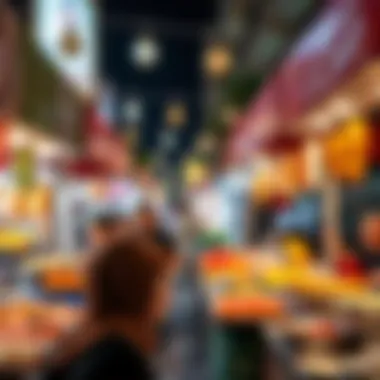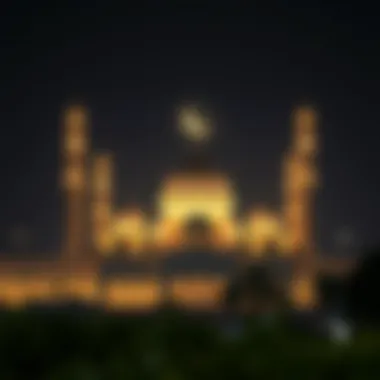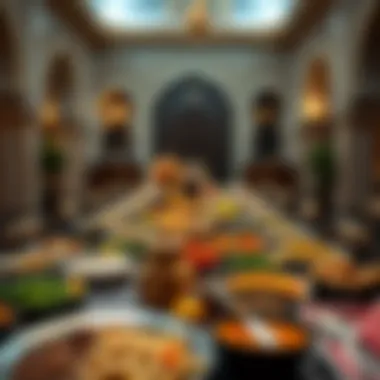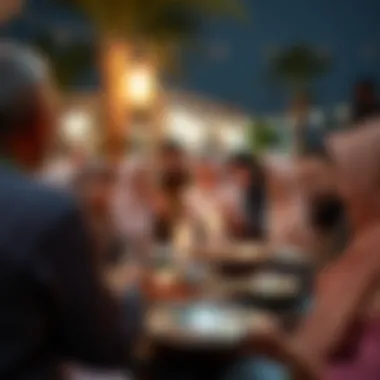Ramadan 2024 in the UAE: Dates and Traditions


Intro
Ramadan is more than just a month of fasting for Muslims; it's a serene time that resonates deeply within the cultural fabric of the UAE. As the crescent moon heralds the beginning of Ramadan in 2024, an atmosphere of reverence sweeps across the nation, inviting both residents and visitors to partake in its unique traditions.
This article will illuminate various aspects of Ramadan in the UAE, highlighting the dates, significant customs, and the communal spirit that defines this holy month. From breaking fasts with dates and water to the profound importance of prayer and reflection, the practices during Ramadan serve to foster a strong sense of community.
Furthermore, Ramadan isn’t just a religious observance. It has practical implications on daily life, especially regarding real estate and economic activity. Understanding these dynamics can provide valuable insights for home buyers, renters, and investors, looking to navigate the property market during this time. The confluence of spirituality and commerce makes this period particularly interesting for those keen on investing in the vibrant UAE real estate landscape.
Overview of Ramadan
Ramadan stands as a pillar in the Islamic faith, holding immense weight not just as a month of fasting but as a period rich with cultural and spiritual significance. This exploration serves to illuminate the various aspects of Ramadan, particularly as it pertains to the United Arab Emirates in 2024. The importance of grasping the essence of Ramadan goes beyond the act of abstaining from food and drink; it encompasses the profound sense of community, devotion, and reflection that envelops the nation during this holy month.
Understanding Ramadan
At its core, Ramadan is the ninth month of the Islamic lunar calendar, a time during which Muslims around the globe engage in fasting from dawn until sunset. This practice is believed to promote self-discipline, cultivate empathy for the less fortunate, and enhance one's spiritual relationship with God. The fast, or sawm, involves refraining from not just food and water, but also from negative thoughts and actions—it’s about purging oneself of vices.
The significance lies in fostering a deeper understanding of one's spirituality. Engaging in nightly prayers known as Taraweeh, people often feel a heightened connection to their faith. There’s also a communal aspect, as families gather to break fast together, reinforcing bonds amidst a backdrop of shared devotion.
Historical Context
Ramadan's roots trace back to the inception of Islam, with its significance captured in the Quran. It commemorates the month in which the Quran was revealed to the Prophet Muhammad. The historical narrative reveals how communities have observed this practice since the establishment of the Islamic tradition, evolving in its expression and significance.
In the UAE, the celebration of Ramadan integrates rich cultural influences unique to the region. People gather in communal spaces, with events extending to include charitable activities and public feasts—elements that highlight the social fabric of Emirati society. The sense of unity among diverse communities during Ramadan speaks volumes about the shared values of goodwill, patience, and reflection that transcend individual differences.
"Ramadan is not just a month of fasting; it's a time for communion, reflection, and a profound reconnection with both oneself and the wider community."
As we delve further into the significance of Ramadan and its unique practices in the UAE, we will uncover how these traditions shape not only the cultural landscape but also influence various aspects of life, including business interactions and community engagement. Understanding these elements will provide a clearer lens through which one can view the essence of Ramadan in a contemporary context.
Ramadan in the UAE
The significance of Ramadan 2024 in the UAE stretches beyond just the act of fasting; it encapsulates a period of reflection, devotion, and communal bonding. In a nation that prides itself on cultural diversity, Ramadan fosters a greater sense of unity and shared experience among both locals and expatriates. Observing Ramadan in the UAE offers a unique glimpse into the Emirati way of life while welcoming the various cultures represented in its population to join in this month of spiritual growth and community support.
The benefits of engaging in Ramadan festivities extend far into the social fabric of the country. For home buyers, real estate investors, and renters alike, understanding the nuances of this period can illuminate potential opportunities in the property market. From insights into rental demand patterns during this holy month to understanding how cultural practices influence community living and investment, being in the know about Ramadan’s impact can be a game-changer.
As we navigate through the details of Ramadan 2024, we will pay close attention to two key aspects: the official dates of the holy month and the celebrations surrounding Eid Al-Fitr, the festival that marks its conclusion. Both these events not only encapsulate the observances unique to the UAE but also provide a backdrop to understand the changing lifestyle and social dynamics in this fast-evolving landscape.
Official Dates of Ramadan
In 2024, Ramadan is anticipated to begin on the evening of Sunday, March 10, and continue until the evening of Tuesday, April 9. However, it is essential to note that the exact start and end dates can vary based on the sighting of the moon, as is traditional in Islamic practice. Therefore, confirming the schedule through local mosques or community guidelines becomes crucial for both residents and those traveling to the UAE during this period.
This moon-sighting tradition serves as a reminder of the spiritual significance of the month. Awaiting the moon’s appearance emphasizes the anticipation and devotion that characterizes Ramadan. For many expatriates and newcomers, this practice offers an opportunity to engage with the local culture, encouraging them to explore the historical and spiritual dimensions of Ramadan.
Eid Al-Fitr and Closure
Eid Al-Fitr, celebrated at the conclusion of Ramadan, stands as a momentous occasion filled with joy and gratitude. Scheduled for Wednesday, April 10, 2024, this festival is a time for family reunions, feasting, and a sense of collective celebration.
Eid isn't just about revelry; it holds a deep-rooted significance in fostering community ties and charitable actions. Many people in the UAE actively participate in giving Zakat al-Fitr, a form of charity traditionally paid before the Eid prayers, to provide for those in need. This culture of giving echoes the values of compassion and unity, reinforcing the broader social framework the UAE embodies.


Indeed, Eid Al-Fitr serves as a fitting closure to Ramadan, offering a chance to reflect on spiritual growth and community engagement during the month. As people gather to partake in communal meals and exchange greetings, it reinforces the shared commitment to faith, love, and support among different nationalities in the UAE.
In summary, understanding the rhythm of Ramadan 2024 in the UAE not only reveals the cultural underpinnings that shape societal interactions but also highlights opportunities for those involved in real estate and community living. Through engaging with these traditions, one stands to gain a richer perspective on life in the Emirates.
Cultural Significance of Ramadan
Ramadan holds a profound place in the hearts and lives of Muslims around the world, particularly in the UAE. This month of fasting goes beyond mere abstinence from food and drink; it’s woven into the very fabric of spiritual growth, community bonds, and cultural identity. Every evening, when the sun dips below the horizon, the call to prayer resonates through the streets, signaling the end of the fast. It's in these moments that the essence of what Ramadan represents truly comes to life.
Spiritual Reflections
During Ramadan, individuals engage in deep spiritual reflection. For many, this month acts as a reset button for their spiritual journey. Fasting serves as a means of self-discipline, pushing individuals to confront their desires and seek a greater connection with God. From dawn until dusk, Muslims refrain from eating, drinking, and even unkind thoughts. This is more than an obligation; it’s about attaining Taqwa, or God-consciousness.
In prayer, many feel uplifted, as nightly Taraweeh prayers become a communal affair. These prayers are not just routine; they’re a chance for personal growth and enhanced rigor in faith. Recitations of the Quran surge, allowing believers to immerse themselves in its teachings. It’s common to see groups gather in the evenings to share interpretations and stories, creating an environment ripe for communal learning and spiritual enrichment.
“Ramadan is a time to open our hearts, heal ourselves, and reconnect with our core beliefs.”
Community Engagement
Community engagement flourishes during Ramadan. Whether it’s through joint Iftar meals or charity initiatives, the month strengthens communal ties. Families and friends come together to break their fast, often with a lavish spread of traditional dishes. It's not just about the food, though; it’s about sharing moments and fostering connections. Many see it as a time when grievances are set aside, and unity is fostered.
Moreover, charities flourish during Ramadan as individuals feel compelled to give back. Many organizations ramp up their efforts to distribute food and aid to the less fortunate. Engaging in charitable acts, such as providing meals to those in need, is a core tenet of the month. This not only helps those less fortunate but also rekindles a sense of gratitude among those who give.
To truly understand the depth of Ramadan’s cultural significance in the UAE, one must recognize how it influences daily interactions. Shops adjust their hours, and even the business landscape changes as companies embrace the spirit of giving. People become more considerate and respectful, often going out of their way to support each other.
Ultimately, Ramadan serves as an essential pillar in promoting compassion and understanding within diverse communities. This month entwines individuals in shared values and communal experiences, reinforcing the importance of unity amid diversity across the UAE.
For further insights on Ramadan and its significance, you can visit Britannica or Wikipedia for comprehensive background information.
Traditions and Customs in the UAE
The traditions and customs surrounding Ramadan in the UAE echo the rich cultural tapestry of the region. This month is not just a time of fasting but a period of deep spiritual connection, community interactions, and social responsibilities. The blend of local customs and Islamic practices creates a unique atmosphere that stands out during this sacred month.
Iftar Practices
The time of Iftar, marking the end of the daily fast, is not merely a meal; it is a communal experience that reinforces social bonds. As the sun sets, families and friends gather to break their fast together, often starting with dates and water as a nod to Prophet Muhammad's traditions. In Dubai and Abu Dhabi, lavish Iftar buffets pop up in hotels, offering an extensive range of dishes that span from traditional Emirati cuisine to international favorites.
- Common Iftar Foods:
- Dates and water
- Lentil soup
- Stuffed grape leaves
- Grilled meats and fresh salads
- Sweets like kunafa and baklava
Restaurants also play a critical role, offering special Iftar menus. In some neighborhoods, street vendors set up stalls, serving delicious Arabic snacks, making the atmosphere lively. Moreover, public events are organized in parks, allowing strangers to come together as they share meals under the starlit sky. This collective tradition not only honors the spirit of Ramadan but also enhances the communal identity, reinforcing the importance of togetherness.
Charitable Activities
Giving back, a core element of Ramadan, is exemplified through various charitable activities that flourish during this period. Many choose to exemplify service through acts of generosity, a principle deeply rooted in Islamic teachings. In the UAE, charity drives gain momentum as individuals and organizations come together to aid those in need, showcasing the human spirit during this holy month.
- Common Charitable Initiatives:


- Distribution of food packages.
- Donations to orphanages and shelters.
- Fundraising events and community auctions.
Organizations like the Red Crescent actively participate by organizing food drives and campaigns for the less fortunate. Residents are often seen making contributions at local mosques or participating in community soup kitchens. The act of giving nourishes a profound sense of purpose, turning Ramadan into a time for empathy and outreach.
Decoration and Festivities
As Ramadan approaches, homes and public spaces in the UAE undergo a delightful transformation. The streets are illuminated with lights, and intricate designs, representing the cultural richness of the region, adorn buildings and homes. Colorful lanterns, known as Fanous, hang from balconies and windows, casting a warm glow in the evening.
- Decoration Highlights:
- Banners with Quranic verses
- Colorful lights enhancing the festive feel
- Traditional crafts and materials used in home decor
Festivities reach their peak in the days leading up to Eid Al-Fitr, with families often starting to shop for new clothing and gifts. Markets buzz with activity as vendors showcase traditional items such as textiles, ceramics, and sweets, enticing locals and tourists alike. These decorations reflect an atmosphere of celebration and joy, creating a unique vibe that invigorates the communal spirit.
In the UAE, Ramadan traditions are not merely observed; they are felt deeply within the community, bridging gaps and fostering a sense of belonging.
Each of these aspects—be it Iftar practices, charitable giving, or vibrant decorations—propels the spirit of Ramadan forward, shaping an enriching experience for all involved.
Impact of Ramadan on Daily Life
Ramadan is not just a month of fasting; it weaves itself intricately into the fabric of daily life in the UAE, influencing everything from business operations to personal interactions. This period of spiritual reflection and communal solidarity reshapes routines, prompting adjustments across various sectors. Its significance extends beyond religious observance, rubbing off onto economic activities, social engagements, and travel patterns.
Business Hours and Practices
During Ramadan, business hours in the UAE undergo noticeable shifts. The typical workday is often shortened to accommodate fasting schedules. Most offices open later than usual, often around 10 a.m. to 2 p.m. or slightly longer, depending on the company policies. It's not uncommon to see shifts in productivity, as employees balance their fasting with professional responsibilities.
Key considerations for businesses include:
- Flexibility in Work Hours: Many employers implement flexible working arrangements, allowing employees to manage their energy levels better while fasting.
- Reduced Customer Traffic: Businesses may adapt their promotional strategies to account for quieter mornings. Post-Iftar, shops and restaurants experience a surge in activity as families and friends gather to break fast.
- Cultural Sensitivity: Companies are encouraged to be mindful of their employees’ needs, fostering a respectful workplace environment.
- Special Offers and Marketing: Retailers often adapt their offers to align with the Ramadan spirit, showcasing discounts on Iftar meals or family-oriented packages.
Thus, Ramadan provides an opportunity for companies to nurture employee morale and engage clients in culturally resonant ways.
Travel and Transportation Considerations
Ramadan also heralds adjustments in travel and transportation habits. Activity peaks after sunset when the day begins anew with Iftar gatherings.
During this time:
- Public Transport Schedules: Public transportation, including buses and metros, may adjust their schedules to cater to increased demand during post-Iftar hours. Travelers should keep an eye out for modified timetables.
- Traffic Patterns: Roads are notably busier in the evenings as families rush home for breaking the fast. It's prudent for drivers to anticipate heavier traffic during this period, allowing for extra travel time.
- Increased Flight Bookings: As people travel home to celebrate with families or plan vacations, airlines may experience a spike in bookings. Early reservations become essential to ensure ease of travel.
- Tourist Considerations: Visitors to the UAE during Ramadan should consider the cultural landscape. Many restaurants are closed during the day, though some cater specifically to tourists. It's beneficial to research and plan dining experiences accordingly to align with local customs.
With so many changes occurring during this month, it's clear that the impact of Ramadan stretches far and wide, shaping the very way people live and interact in the UAE.
“Embracing the spirit of Ramadan leads to an enriching experience, highlighting the importance of community while respecting individual practices.”
As the UAE gears up for Ramadan 2024, both residents and visitors alike can expect their daily routines to be profoundly influenced by this event, fostering a unique blend of spirituality and practicality. Those who pay close attention to these dynamics can navigate this month with greater ease and respect, ultimately enhancing their experiences.
Safety and Regulations During Ramadan


Understanding the significance of safety and regulations during Ramadan in the UAE is paramount. This period of fasting, reflection, and community engagement introduces certain guidelines that amplify the respect and sanctity of the month. Comprehending these regulations not only ensures adherence to cultural norms but also fosters a spirit of harmony among diverse communities. Observing these guidelines contributes to a respectful atmosphere, benefiting both residents and visitors alike.
Respectful Behavior in Public Spaces
During Ramadan, the expectation for respectful behavior in public spaces forms a cornerstone of the UAE's cultural landscape. This time calls for a heightened awareness, especially regarding eating, drinking, or smoking in public areas. Non-Muslims are encouraged to observe a code of conduct that mirrors the spirit of the fast.
- Dining Etiquette: Eating in public can be seen as disrespectful. It’s best to keep meals discreet and confined to private settings or designated locations. Some establishments may offer take-away services to accommodate those not observing the fast.
- Dress Codes: Modesty in attire is encouraged. The warmth of the desert sun is coupled with a sense of propriety. Although the UAE is relatively liberal, maintaining a respectful appearance reflects consideration for local customs and traditions.
In Ramadan, it’s not just about fasting; it's about fostering unity and understanding across all cultures in the UAE.
Health and Wellness Considerations
Health and wellness during Ramadan is a vital aspect, especially for those who fast. Balancing religious observances with personal health is key, as fasting can impact one’s physical and emotional states. Paying attention to health guidelines can help ensure a fruitful month.
- Hydration is Key: As the sun blazes during the day, the risk of dehydration increases. It’s essential to hydrate properly during non-fasting hours. Drinking plenty of water after iftar and before suhoor is crucial.
- Nutritional Choices: Opt for balanced meals during iftar and suhoor that provide sustained energy levels. Including a variety of food groups—vegetables, proteins, and whole grains—can help maintain vitality throughout the day.
- Rest and Sleep: Adequate rest is essential. It’s common to experience changes in sleep patterns due to late-night activities or early morning meals. Balancing sleep with Ramadan activities aids in maintaining overall health and wellness.
For more information on adhering to health during Ramadan, you can visit reputable sources like Healthline and Mayo Clinic.
Real Estate Market Considerations
The correlation between Ramadan and the real estate sector in the UAE is a subtle yet significant one. During this holy month, there are observable shifts in the market dynamics. As people focus on spirituality and family, their housing needs and preferences may alter, impacting both buyers and renters in unique ways.
Investment Opportunities During Ramadan
Investors with a keen eye can discover hidden gems in the real estate market during Ramadan. Typically, there is a slight slowdown in transaction activities as many communities engage in fasting and other religious commitments. This environment can create ripe conditions for negotiations, allowing buyers to snag properties at favorable prices.
- Reduced Competition: Many prospective buyers may step back due to Ramadan’s observances. This can lead to lesser competition in both residential and commercial real estate, giving the upper hand to those still in the market.
- Flexible Sellers: Some sellers may become more flexible during this period due to a slightly softer demand, providing a chance for buyers to negotiate better deals.
- Off-Season Pricing: With other buyers focused elsewhere, this may be the time to explore properties that had previously been out of reach due to market highs.
Overall, Ramadan can provide advantageous investment openings for those willing to delve deeper into the market.
Rental Dynamics in Ramadan
The rental landscape during Ramadan also showcases fascinating nuances. While demand may increase for short-term leases, such as furnished apartments—catering to visitors and expatriates wanting to experience the month—long-term rental trends also shift.
- Increased Demand for Accommodations: Families often seek larger spaces or higher-end properties to accommodate guests joining them for Iftar or other communal celebrations.
- Negotiation Leverage for Renters: Potential renters might find landlords more willing to negotiate terms as they too are accommodating the spirit of the month and the community dwellers.
- Fewer Listings: As many landlords prefer to hold off listing properties during fasting hours for respect, the available options may shrink, yet those that remain often afford tenants premium choices in vibrant neighborhoods.
The End
Ramadan holds significant importance in the cultural and social landscape of the UAE, and this article has aimed to provide a comprehensive snapshot of its essence in 2024. The period of Ramadan is not just about fasting but reflects a month rich with spiritual depth, community bonding, and unique traditions that shape the everyday experiences of residents and visitors alike.
Reflection on Ramadan’s Importance
At its core, Ramadan serves as a time for self-reflection and spiritual rejuvenation. For many, this month is a chance to reconnect with their faith, strengthen their bonds within the community, and engage in acts of charity. The fast observed during daylight hours fosters a deep sense of empathy for those less fortunate. This empathy cultivates a community spirit, encouraging individuals to reach out and support one another.
In the UAE, this month sees an upsurge in communal gatherings for Iftar—the evening meal breaking the fast—bringing friends, families, and neighbors together. It's not just about the food; it’s about sharing moments, stories, and values. As the sun sets, mosques and homes alike resonate with the laughter and chatter of people coming together, thereby deepening social ties.
Moreover, one cannot overlook the economic impact Ramadan carries. The month witnesses spikes in various sectors such as retail, hospitality, and real estate, allowing businesses to flourish through tailored offerings and evening events. Thus, recognizing Ramadan’s significance can enhance understanding within the community and beyond, and is especially vital for real estate professionals and investors looking to capitalize on seasonal trends.
Looking Towards Future Celebrations
As the year progresses, the anticipation of future Ramadan celebrations continues to grow. Each year brings an opportunity for renewal, offering fresh perspectives and experiences. The lessons learned and values embraced during Ramadan often resonate long after the month concludes. There is an expectation that future celebrations will see more elaborate communal events and enhancements in community engagement, further enriching the cultural tapestry of the UAE.
Looking ahead, the integration of technology in Ramadan experiences is likely to transform how people connect and interact. Social media platforms, apps, and online communities are becoming avenues where individuals share Iftar recipes, discussions about spirituality, and initiatives for charity.



